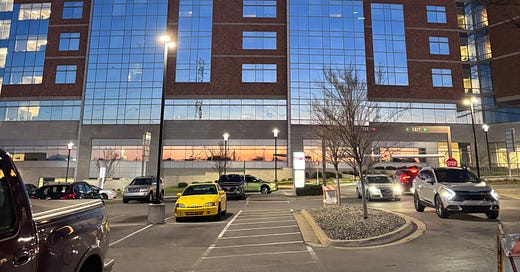108 - I couldn't be there when my loved one died.
On the survey, on moments of death, and on a holiday that's honest for grieving people.
Welcome back! (or welcome!).
Thank you!
In the last two newsletters, I’ve shared a survey link. I also shared that link to subscribers at 300wordsaday. All together, there were about 1,000 email addresses, with some overlap.
I had over 200 complete and partial surveys. It’s awesome.
So I’m closing that survey in a couple days. I’m just starting to look at the results, and I’ll start sharing them in a couple weeks.
But at the moment, I want to say “Thank you.” For reading this newsletter and for responding to the questions.
(Last time to take it: What research shows about grief.)
On missing the moment of death
I wrote the following three years ago when we were deep into difficult times. But most of you haven’t read them, and they are still very true.
+++
These days, and all days, people die, and family isn’t present. It’s particularly hard when rules keep people away. But sometimes it’s distance, sometimes it’s relationship, sometimes it’s timing.
From my observations as a chaplain and as a human, I’d like to suggest some of the reasons we feel so emotionally hurt when we know we might not be present.
This is not an exhaustive list (though it feels exhausting). Often we simply want to be present. But I’ve seen these and so I want to offer them to you to think about.
We are afraid of failing them when they didn’t fail us.
We are afraid of missing last words.
We are afraid of not being able to say last words.
We are afraid of not measuring up.
We are afraid that someone will think we haven’t cared.
We are afraid.
We are afraid that what we have said in the past won’t count somehow.
We are afraid that they will feel alone at the very end and that we ought to be there.
We are afraid that they won’t have someone to speak for them at the most vulnerable time.
We are afraid that we will miss something.
We are afraid that we didn’t tell them that we loved them enough, or at all.
We are afraid that the people who are around us will judge our love.
We are afraid that our presence might have brought about a miracle and if we aren’t there, it won’t happen.
We are afraid.
We are afraid that unless we see them all the way through that we are somehow deficient.
We are afraid of not being with the one person that held us together, that held our family together, that gave us a reason for living, that remembers everything that matters to us, that sustained us when we couldn’t sustain ourselves.
Because of the depth of those fears, not being with someone at their point of death is hard. And the truth? Being there at their point of death is hard, too. I know it from being with people I love. And I know it from being with people who I’ve never met until those last five minutes.
So what’s my advice?
Think about why it is so hard. Give voice to the reason. And do what is possible to address the thing you are afraid of.
If you needed to say something, say it now.
If you are afraid of what people will think if you aren’t present when your loved one is dying, tell them to shut up.
If you are afraid of them being all alone, find out who from the care facility will be there. And let them know how grateful you are and ask if you can talk one last time to your loved one. Even if they can’t respond.
And think about what they wanted in their most vulnerable moments. Some of us want people around. Some of us don’t. It’s interesting to me the times that a person dies after everyone has come and gone. As if they don’t want their last moment to be their loved one’s last memory.
It’s hard. All of dying is hard.
But sometimes, if we can think through what causes our fear and address those things, we can stop being so hard on ourselves.
+++
A complicated holiday weekend.
Between now and the next newsletter, we’ll remember a last meal, a betrayal, a denial, a state supported murder, destroyed dreams and expectations, all the expressions of grief, apparent silence from God, a charity burial, incomplete burial preparations. And eventually and unexpectedly a Resurrection. And remorse. And uncertainty.
For my work and for our lives, I’m grateful to know Jesus who was “despised and abandoned by men, a man of great pain and familiar with sickness; and like one from whom people hide their faces, He was despised, and we had no regard for Him.”
One who knows the worst, from the inside, can meaningfully offer hope.
Have some hope this weekend.
Jon




